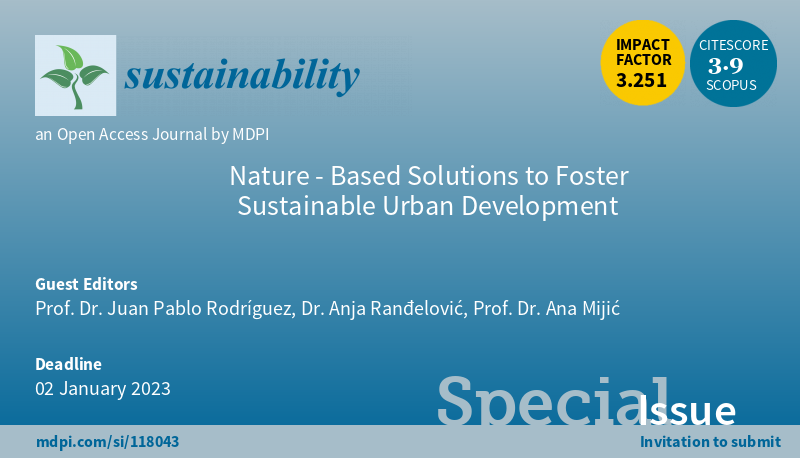euPOLIS Experts On Editorial Board Of The Special Issue Of The “Sustainability”
The team of euPOLIS partners from Universidad de Los Andes, Imperial College London, and the Faculty of Civil Engineering from Belgrade will be the guest-editors of the upcoming Special Issue of the “Sustainability”, an international, cross-disciplinary, scholarly, peer-reviewed, and open-access journal of environmental, cultural, economic, and social sustainability of human beings.

The journal has an open call for scientific papers and the deadline for manuscript submissions is January 2nd, 2023.
Prof. Juan Pablo Rodriguez Sánchez (Universidad de Los Andes) got invited to be the Special Issue of Sustainability editor (Nature-Based Solutions to Foster Sustainable Urban Development). Professor Rodríguez Sánchez invited Anja Ranđelović (University of Belgrade) and Ana Mijić (Imperial College London) as editors of the SI so to secure the euPOLIS methodology and approach will be presented in this edition dedicated to Nature-Based Solutions (NBS).
Our research team points out that despite recent progress in understanding NBS benefits, there is a need to develop new urban planning approaches based on site-specific priority criteria to identify urban challenges, select the best suited NBS, and quantify the benefits derived from their implementation. The special issue in Sustainability aims to increase the current knowledge on NBS urban planning by analyzing the selection criteria, benefit accounting, and benefits monitoring to understand the economic, social, and environmental impact of NBS implementation in the urban context.
The increasing trend of the urbanization process and the current climate crisis had produced adverse effects on citizens’ quality of life. Under this scenario, nature-based solutions (NbS) are recognized as an essential ally to improve cities’ resilience and generate environmental, social, and economic benefits without adding significant cost. Scientific literature provides evidence of direct NbS benefits quantification in the city context by means of remote sensing-basedmonitoring, environmental matrices sampling and in-situ testing, among others.
Specifically, this special issue will explore:
1. NBS implementation criteria: include the construction of indicators to identify the social, environmental, and economic challenges potentially solved by NBS implementation.
2. NBS selection: explore the development of decision support tools to select the best NBS systems according to the needs identified by a people-centered approach.
3. NBS benefit accounting: as ecosystem services or benefits derived from the NBS implementation by the use of direct or indirect techniques of quantification (e, g., in situ environmental monitoring systems, interviews, questionaries, economic valuation, ecologic evaluation) that support the decision process.
This issue is particularly looking for multidisciplinary methodologies for ecosystem services assessment of NBS implementation in an urban context. Click here for more information about this SI.
